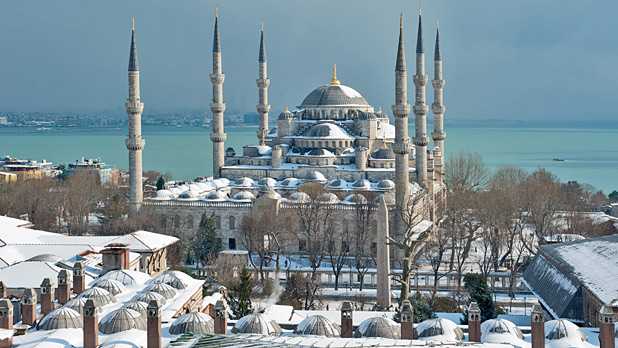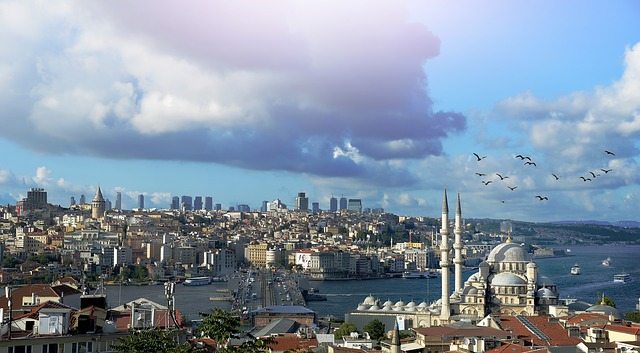After the collapse of USSR, necessaries of new states were that economic, politic, military and educational relations with each other and other international platforms and countries. On that way all former Soviet countries created Commonwealth of Independence States union. With creation of CIS, these countries which were unificated on old Soviet map will create new relations on the new world system. Also for regulating new systems, geopolitical situation was very important. Firstly a state can create strong relations where it was near another state.
If we describe relations between Turkey and Azerbaijan, we will see influence of border factor. Strong relations of Turkey with Azerbaijan are result of near abroad condition.
Cooperations of Turkey and Azerbaijan had been decreased sometimes. But it ended in new powerful authorities.
Pro Russian politics of Ayaz Muttalibov influenced Turkish relations as only embassy found. In short time of Muttalibov administrative Turkey was working to make new perspective for other Turkish countries.
Ebulfez Elchibey who came to power after Muttalibov followed new way Pro Turkish politics as opposite to Muttalibov. So many agreements had been created in economy, military, education, energy, politics and new activities started. First military cooperations between Azerbaijan and Turkey borned in that time.
In 1992 military education agreement signed between Azerbaijani and Turkish government. In this period Azerbaijan was working to create international pressure circumstances on Armenia about Nagorno Karabakh conflict. So military agreements with Turkey, created new tensions in this region. We can say a diminish symbol with Russia as military.
Military conventions were less than next years in new political actions to make strong authority and balanced actions period. Haydar Aliyev’s balance political way made a cooperation as pragmatist mind of Azerbaijan. We will see importance of Turkish military agreements. Because if Azerbaijan want to be important actor on this region, it should regulate new relations for the USA and NATO via Turkey.
In 1996 between the government of the Republic of Azerbaijan and the government of the Republic of Turkey on base of cooperation of staff members of supporting service of Armed Forces protocol signed.
In 1997 between the government of the Republic of Azerbaijan and the government of the Republic of Turkey on regulation of civil and military flying in 10 km of astride Azerbaijan-Turkey border protocol signed.
In that time agreements of Azerbaijan with Iran and Russia were targeting only friendship situation and solve problems on bounds And agreements with the USA were not totally military cooperations. It is important to not forget that Russian embargo on Azerbaijan because of Chechen problem increased Turkish inclination on military subjects. Strong relations with Turkey of Azerbaijan will create new diplomatical positions from Cyprus to Yerevan.
Military positions as international importance of Azerbaijan borned with agreement between the government of the Republic of Azerbaijan and the government of the Republic of Turkey on activities of platoon of Azerbaijan is going to the Kosovo in the staff of Turkey battalion.
Azerbaijan will keep its soldiers untill period of independence of Kosovo. With this step Azerbaijan became an important and strategical country on extend to East policy of NATO. Azerbaijan won a good position on Caucasus region with taking some other militaryal duties via Turkey in different countries.
In 2000 between the Ministry of defense of the Republic of Azerbaijan and Head of Naval Forces of Republic of Turkey about giving the attack launch of AB-34 P-134 to the Azerbaijan protocol signed and :
– Protocol between the Ministry of defense of the Republic of Azerbaijan and Ministry of national security of Republic of Turkey on cooperation in the topographical area,
– Protocol between the Republic of Azerbaijan and the Republic of Turkey on forming and training of profession school of forces kind of Baku,
– Protocol between the Ministry of defense of the Republic of Azerbaijan and the General Staff of the Republic of Turkey on carrying out of the material and technical purchasing,
– Agreement between the government of the Republic of Azerbaijan and the government of the Republic of Turkey on military industry cooperation signed.
In 2001 between the Ministry of Defense of the Republic of Azerbaijan and the General Staff of the Republic of Turkey on development of Nakhchivan 5th army protocol;
In 2002 Ministry of defense of the Republic of Azerbaijan and the General Staff of the Republic of Turkey on cooperation in the area of war history, military archive and museum work and military publication protocol and in 2003 between the government of the Republic of Azerbaijan and the government of the Republic of on training, material and technical assistance of State Border Service of Azerbaijan by Armed Forces of Turkey and Protocol between Azerbaijan, Georgia and Turkey on cooperation in the safety of the West-East energy corridor protocol signed.
Since 1999 Azerbaijan took steps quickly. As opposite to Azerbaijan and Turkey, Armenia and Greece signed an agreement as “Send Armenian soldiers to Kosovo via Greek army”. Armenian parliament agreed this on 13 December 2003. According to this agreement 30 Armenian soldiers had gone to Kosovo with ratification of Ministry of Defence of Armenia. It had been explained as to support European-Atlantic integration on South Caucasus. Against to modernization of Azerbaijan by Turkish Military Forces, Greece take a decision to support to Armenian army. Also military cooperations created influences on political problems. In that time mix circumstances about these events will share a balance of situations on energy and trade agreements.
After the September 11 terrorist acts, Azerbaijan supported the decision of counter attack to terrorism of the USA. So it sent some peacekeepers to Afghanistan and opened air space for American forces. These actions share Turkish support and modernisation to Azerbaijani army. Azerbaijan use this experiment to be main actor in the region.
In 2004 and 2005 between the government of the Republic of Azerbaijan and the government of the Republic of Turkey on long-term economical and military cooperation and between the Ministry of Defense of the Republic of Azerbaijan and the General Staff of the Republic of Turkey on application of the financial aid protocol signed.
And in 2006 between the Ministry of Defense of the Republic of Azerbaijan and the General Staff of the Republic of Turkey on application of material and technical provision protocol shared new improvements of new actor.
Since 2006 new approaches regulated cooperations with other states :
– Supports of Azerbaijan to Turkish Republic of Northern Cyprus,
– Turkey purchases rockets from the USA,
– New relations of Georgia, Azerbaijan and Turkey as result of alternative energy way against to Russia.
Same year new circumstances created balance regulations for Azerbaijan with agreement of natural gas project with Greece. It was political and militaryal goal of Azerbaijan because Yerevan loosed its good militaryal and political relations with Greece. So it must choose a new way as balance politics.
There is a balance activities with military cooperations of Azerbaijani relations from the independence time. Pro Turkish military activities regulated international perspective on problems of Azerbaijan. Example, mainly Azerbaijan use Cyprus card about Greek support to Armenia. And also it used totally the USA and NATO supports and created new politics as alternative to Russia. We can say thay experiments of Elchibey’s totally Pro Turkish politics and Aliyev’s balance politics which agree all region as a whole will regulate positions of Caucasus region.
Mehmet Fatih ÖZTARSU / Baku Qafqaz University






